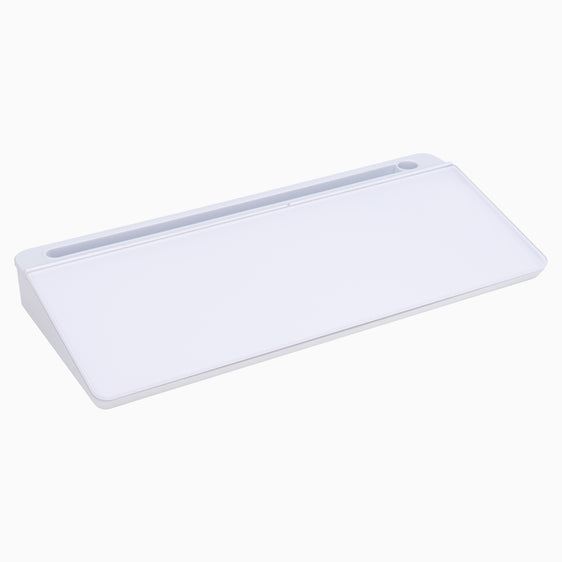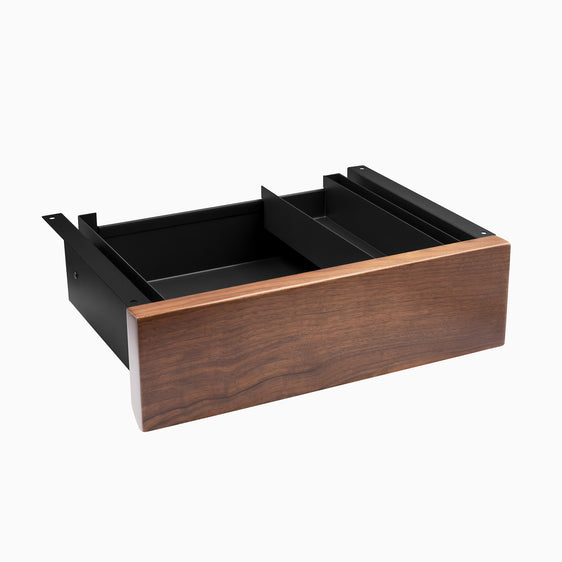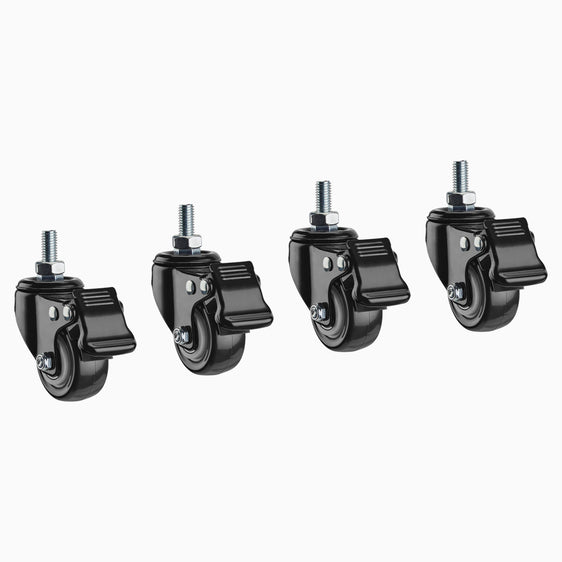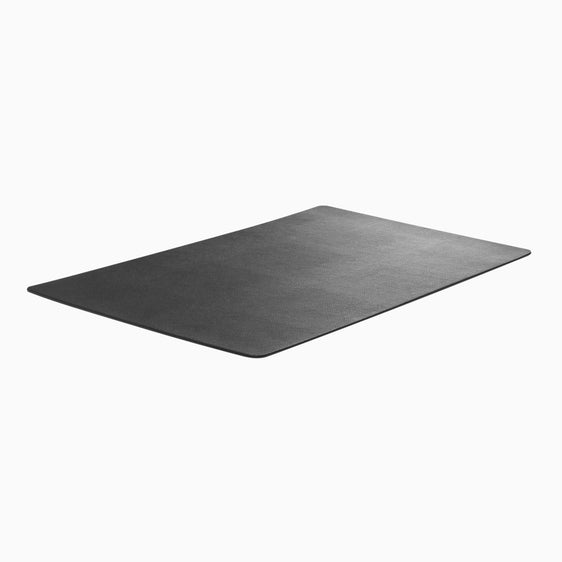
News
Is It Better To Work Standing or Sitting?
Hayden AdamsIf you have a desk job, you might be wondering about the supposed benefits of standing desks. There are plenty of health risks from prolonged sitting, but if you’re an active person, regularly take the stairs, and even walk around the office on your coffee breaks, you might think a standing desk isn’t worth the trouble.
After all, working on your feet all day every day can bring about a whole new crop of health risks. So, which is a better way to work – standing or sitting?
Are Standing Desks Better Than Sitting?
There is a study that shows being on your feet all day is twice as bad as sitting for your heart. However, sitting throughout the day has negative health impact; it can raise your risk of diabetes, stroke, high blood pressure, and high cholesterol.
A combination of both standing and sitting is ideal, which is why an adjustable standing desk is an excellent investment for anyone trying to improve their health. Sitting for long periods or standing for extended periods have negative health implications.
Various scientific studies attest to the efficacy of standing desks. One such exploration spearheaded by Dr Charlotte Edwardson found that - height-adjustable workspaces positively impact workplace wellbeing.
Notably, the study points out slight advancements in stress management, general health, employer vitality, and, notably, subsiding leg pains. This exploration underlines the potential of standing desks for not only enhancing productivity but also improving the emotional landscape of the workplace.
Standing Desk vs. Ergonomic Chair: Which Is Better?
The biggest difference between a standing desk and an ergonomic chair is the fact that standing tends to be better for your health than sitting. So, spending all of your time at a standing desk might be a better option if your health allows you to.
That said, there are always going to be times when you’re required or expected to sit at a desk. If you’re in the workplace, it’s hard to get around that fact. Whether you need to go to regular meetings or your workplace requires uniformity and doesn’t allow standing, you might need to utilize an ergonomic chair.
In most scenarios, though, people enjoy a combination of sitting and standing while they work. It gets tiring to be on your feet for eight hours a day, week after week. So, our recommendation is to invest in a comfortable ergonomic chair with adjustable lumbar support as well as a standing desk.

Science Behind Standing Desks
Several studies show that standing at a height adjustable desk reduces the effects of a sedentary lifestyle, which can boost health benefits. However, prolonged standing can come with issues of its own.
{{ spec_dual_softwood_desk }}
Working in the same position for a long time can lead to poor blood circulation and other ill effects. Because of this, many office workers combat prolonged sitting by doing exercises throughout the day. Even some small physical activity every half hour can help protect against poor health or even premature death.
Even so, some people believe moving from a regular desk to a sit-stand workstation is not necessary. If they can increase their physical activity throughout the day, they believe this is enough to stave off poor health.
Regular exercise helps keep a person healthy, but it can be hard to do when you’re at work for eight hours a day. If you have an office job, regular exercise is even harder to accomplish because you are sitting behind a desk for hours at a time.
Sitting reduces your muscle activity, giving you an increased risk of low blood circulation, leading to high blood pressure and heart disease.
Seated exercises can help you achieve a healthy lifestyle, but they aren’t enough by themselves. That’s where standing at work can help you.
Standing at work forces your body to be constantly alert. Most people find standing for six hours a day exhausting because it uses a lot of stamina. Jobs that typically include a lot of standing around, such as retail jobs, often utilize anti-fatigue mats that help reduce foot and back pain so you can stand for long periods.
{{ spec_anti_fatigue_mat }}
Though prolonged standing can be difficult to endure, standing at work has many positive health implications and can encourage a healthy lifestyle.
Standing Desk Advantages
Standing desks offer significant benefits to users. Below, we'll talk about them in detail.
Productivity in the workplace
Studies conducted in high-pressure environments like call centres showed noteworthy enhancements in productivity with the incorporation of standing desks. Participants observed a 45% productivity improvement compared to their seated counterparts.
Fixing bad posture
Utilising a standing desk, along with maintaining proper ergonomics, can play a major role in promoting good posture. An ideal ergonomic setup involves adjusting the desk and monitor heights, keyboard and mouse placement, and sitting or standing postures, allowing for a proactive approach to posture improvement.
Sit-stand desks encourage a dynamic and natural workflow, promoting muscle engagement that traditional seated desks simply can't offer. Over time, repetitive use of these dynamic positions helps to build postural strength.
Back Health
Standing desks, when used incorrectly or excessively, could contribute to problems like postural syndrome, a condition often attributed to maintaining poor posture for an extended period of time. Users may experience discomfort, pain, and fatigue in the joints and the back if regular breaks or periods of sitting are not incorporated into their routine.
Ergonomic standards can provide a solution. Ensuring that your standing desk is set up correctly where the desk height and the arrangement of the monitor, keyboard, and mouse are comfortable, can significantly improve the standing experience.
Chiropractors approved
Aligning with this trend towards healthier workplaces, chiropractors endorse the use of standing desks, advising this to their clients regularly. This suggestion is primarily due to prolonged seating and poor posture's potential to cause musculoskeletal issues.
Conditions such as back pain, neck tension, and persistent headaches can be directly linked with excessive periods of bad posture. By integrating a standing desk into the work routine, individuals can derive health advantages and potentially prevent such issues.
Better focus
The use of a standing desk can indeed enhance focus by boosting energy and mood. Sitting for prolonged periods often leads to fatigue and sluggishness, which are detrimental to maintaining concentration.
By allowing users to stand, the desk combats feelings of tiredness, resulting in improved focus. This is particularly beneficial in work environments where maintaining productivity is paramount.
Good for studying
Unquestionably, standing desks are beneficial for studying. Ergonomics show that switching to a standing desk fosters better posture, which is useful in relieving backaches.
More compellingly, standing while working or studying stimulates a greater flow of oxygenated blood towards the brain. This physiological effect brings about augmented energy levels and improved focus, making it an ideal practice for diligent learners.

Is Sitting Behind Your Desk Bad for Your Health?
Using a standing desk for long periods can reduce health problems, help burn more calories, and even encourage good posture. In contrast, prolonged sitting can increase certain health problems, such as weight gain, high blood sugar, neck pain. It can even lead to heart disease.
Sitting without moving for hours at a time causes everything in your body to slow down. You’ll burn less energy, and there’s less for your body to do. Your blood flows slower because your muscles aren’t working as hard. As a consequence, you don’t need as much oxygen.
Your muscles begin to relax, which can pull you into a position where you don’t use them at all, resulting in bad posture. The longer you go without using your muscles, the weaker they become.
When you stand up, you will have a harder time standing with good posture, as you have become used to a slouching position, and your muscles are no longer strong enough to pull you back into proper shape.
In contrast, standing for a long time uses up a good deal of stamina. Instead of your muscles consistently doing less, they are consistently working harder to keep you upright. Having your muscles engaged increases your blood flow.
Because standing for long periods uses your muscles much more than sitting, there is more energy expenditure with standing at work. After hours of constant standing, your muscles will start to fatigue, using up more energy and helping you to burn calories.
Though it can be tough to do, standing versus sitting at work helps combat a sedentary lifestyle and can be a healthier option.
Why Standing at Your Desk Is Better than Sitting
As noted above, standing instead of sitting can help increase blood circulation and prevent your muscles from weakening. But, is it distracting? Will standing all day negatively impact your productivity?
In a study involving elementary school children, the use of standing desks did not inhibit their ability to learn or perform. This study indicates that standing desks do not negatively affect productivity.
Though elementary children are often full of energy and like to fidget, using standing desks did not take away from their learning experience. This finding could suggest that a non-sedentary learning process works just as well as a sedentary learning process. Therefore, you can learn and concentrate on your feet equally as well as if you were sitting down.
Another study found that using a sit-stand desk can increase productivity. Workers who use standing vs sitting desks can have as much as a 45% increase in their overall daily performance.
When you are consistently coming to work to sit all day, your mind and body fall into a habit of sedentary tendencies. Not only does your body stop moving, but so does your brain.
Your blood is flowing slower throughout your body because you aren’t moving, bringing less oxygen to your muscles – and your mind. If you’re standing, your blood flows faster, giving more oxygen to your brain and helping you think.
When you have an easier time concentrating, you can increase your productivity and get more done.
In a third instance, a study involving high school students showed increased focus and memory in students who used a standing desk. This finding supports the idea that standing increases blood flow to your brain to help you think and concentrate. When you’re standing, you tend to be more alert and therefore more ready to absorb new information or ready to focus on a particular task.
A release from Harvard Health Publishing also suggests that focus might increase with a standing desk, as standing can reduce back or neck pain. This lack of pain allows a person to focus more intently on the task at hand.
Do You Think Better Sitting or Standing?

Research suggests that people can think better when standing vs sitting. Increased blood circulation can help boost cognitive processes, helping you to concentrate on your work. The simple task of standing instead of sitting can increase your blood circulation without you needing to increase your heart rate by exercising or other strenuous activity.
Increased focus and memory can in turn lead to an increase in productivity and performance. You can think better and concentrate more on the tasks in front of you, and even learn at the same rate as if you were sitting down. Standing has the tendency to engage your brain, making it less likely that your mind will wander.
Similarly, if you have fewer distractions, such as pain, you will be able to focus better on your work. Prolonged sitting can increase pain in people who have desk jobs, making it more difficult to concentrate. Standing versus sitting can help alleviate pain, allowing you to concentrate and think better.
Although distractions can still occur when standing, the comparative analysis tends to show the edge of standing over sitting when it comes to focus and overall cognition.
This is particularly relevant for individuals with ADHD, who often struggle with maintaining focus. Standing desks can offer a significant benefit by providing a more dynamic work environment that helps mitigate the restlessness associated with ADHD. In the next section, we'll explore how standing desks can be an effective tool for managing ADHD symptoms.
Does Standing Help Strengthen Your Back?
Standing doesn’t help strengthen your back, but it can help reduce back discomfort. According to one study, patients who used a standing desk and took part in counselling to improve sedentary behavior reduced their back pain significantly compared to a control group with neither intervention.

Standing Desks For ADHD
Standing desks can indeed aid those with ADHD, primarily by providing an outlet for restless energy. One of the main characteristics of ADHD is the need for consistent movement, which sitting doesn't accommodate. On the other hand, the flexibility to stand and move can help to manage restlessness and improve focus.
Here are some benefits of standing desks with respect to ADHD:
- They provide an outlet for restless energy
- It contributes to better classroom and workspace management
- Enhances self-esteem
- Increases involvement from more reserved individuals
As we see in "Standing Desks In Schools: Should You Switch To A Standing Desk?", standing desks represent a big leap in ergonomic design to accommodate various work styles, especially those needed by people with ADHD.
Best Desk Kind For ADHD
When choosing a desk for ADHD, flexibility is key. One of the best standing desks is from Desky. Their wide range of standing desks can be adjusted to accommodate both sitting and standing positions, providing the flexibility that ADHD individuals often need for concentrating on computer tasks.
Whether you want a pneumatic desk that uses air pressure to lift and lower the desk or an electric desk that has a motorized mechanism, Desky has you covered. Accommodating restlessness while still remaining productive is a priority, and sit-stand desks allow for that.
Is it Better to Sit or Stand at a Desk?
Studies from Harvard Medical School show that while standing cannot stave off weight gain, it can combat certain health effects, such as shoulder or back pain. However, though studies, including those by Harvard Health, suggest that sit-stand desks can decrease distractions and increase productivity, there are still health risks that can occur when standing for six hours or more.
Is Standing Better Than Sitting for Circulation?
Unique studies have unmasked an intriguing correlation between body posture and circulatory health. Contrasting lower limb blood flow and blood pressure in standing and standing positions showed fascinating results.
As expected, standing work showed increased blood flow by 77% in the lower body. This led to an elevation in the mean arterial pressure (MAP) by 37.2 mm Hg—a considerable difference!
{{ spec_dual_ergo_edge }}
Benefits and Risks of Sitting at a Standing Desk
Even if you have a standing desk, there are both benefits and risks to sitting at one.
The benefits of sitting for extended periods include:
-
More core strength
-
Less back and foot pain
If standing even for a short time gives you back or foot pain, sitting down can help to alleviate the stress put on your body. Because standing for long periods also results in energy expenditure, you can get very fatigued from standing for hours at a time. Sitting can help you to regain your lost energy, allowing you to rest and recover.
Sitting with the correct posture can also help improve your core strength, especially if you sit on the floor or use an exercise ball.
The risks of prolonged sitting include:
-
Stiff muscles and joints
-
Loss of flexibility
-
Weight gain
-
Increased risk of heart issues
As mentioned above, sitting for long periods can increase the risk of heart issues. Your blood circulation slows down, your blood pressure rises, and you risk the increased possibility of heart disease or heart attacks.
However, being sedentary can also result in increased stiffness, as your muscles work less and don’t have as much demand. Increased stiffness will also contribute to a loss of flexibility, and both these things together will limit your ability to enjoy certain pastimes such as physical activity. You might also find that you start to have mobility issues.
Sitting down will also result in a slower metabolism, meaning you’ll need less fuel to fit your energy levels. If you are used to eating more food, you will still eat the same amount you needed when you were more active and energetic. However, because you are no longer working hard, these extra calories turn into fat for storage. Getting an office job that requires a stationary routine will likely result in increased weight.
Benefits and Risks of Standing at a Standing Desk

Standing for six hours or more a day can provide both benefits and risks to your health. It’s important to understand both, so you can make a more informed decision about what’s right for your needs.
The benefits of standing for long periods include:
-
Better blood circulation
-
Reduced back pain
-
More productivity
As you can imagine, standing up uses more energy than sitting. You’ll have an increased blood flow, lowering your blood sugar and pressure, and helping you to avoid such issues as heart attacks and diabetes.
It can also help sharpen your focus so you get more done, improving your overall performance.
For some people, standing can even improve back pain, as it can help improve posture and realign your shoulders properly.
However, standing for long periods can also bring about less ideal health implications, and even risks.
These risks of standing for long periods include:
- Varicose veins
- Strained foot ligaments
- Back pain
- Sore feet
- Swelling of the legs
- Muscular fatigue
- Shoulder and neck stiffness
- Lower back pain
Varicose veins can come from either sitting or standing too long. They can come about from increased blood pressure, which can occur in your legs from too much standing. Alternatively, standing for hours on end can put pressure on your veins, resulting in blood pooling that contributes to varicose veins. Resting your legs and elevating your feet can help prevent this issue.
Some people also experience strained ligaments in their feet or back pain from standing. These issues come about from too much standing, where your body comes under strain from constantly trying to keep you upright. Just like any exercise, if you do it too much you can fatigue your muscles and ligaments and risk straining or tearing them.
Because both sitting and standing for prolonged periods can carry health risks, it’s better to work both into your daily routine. Getting a sit-stand desk can allow you to add more movement into your schedule so you don’t have to go through the entire day in the same position while giving you the option to sit down and rest when you’re feeling fatigued.
Why Its Bad To Stand At A Standing Desk All Day
Optimal use of a standing desk requires a balance between standing and sitting. Prolonged standing can trigger lower back problems and conditions affecting leg muscles, tendons, and veins. A study published in the Ergonomics journal highlighted potential discomfort and reduced reaction times as repercussions of extended periods of standing.
Downsides Of Using Standing Desk
While standing desks promote a healthier lifestyle by encouraging movement, the regular use of these desks could be challenging. Some of these challenges include:
- The transition phase from sitting to standing could be uncomfortable initially.
- Some users might find maintaining a correct posture difficult while standing.
- Extensive use could result in muscle fatigue
- Prolonged standing can contribute to the development of varicose veins.
- Lower back pain and stiffness in the neck and shoulders can all result from long-term standing work.
Optimal Time Spent At A Standing Desk
Though standing desks offer numerous advantages, their continuous and unchecked use can cause discomfort and fatigue. Implementing a balanced approach, by alternating between sitting and standing postures, creates a more comfortable and effective working environment.
A common and recommended practice involves standing for intervals of 30-60 minutes, followed by resting periods where you sit. This simple yet effective strategy provides you with the flexibility to enjoy the benefits of a standing desk, while also giving your body the necessary rest.
Choosing From Standing vs. Non-Standing Desk
Opting for a standing desk may prove a step towards healthier work habits. Standing desks encourage more movement throughout the day and break the cycle of prolonged sitting. A standing desk isn't a magical cure-all but rather a tool that can help you stay active and shift between different work positions, promoting balance and flexibility.
It's essential to understand that standing desks are not a solution to a sedentary lifestyle but rather offer a balance between sitting and standing.








